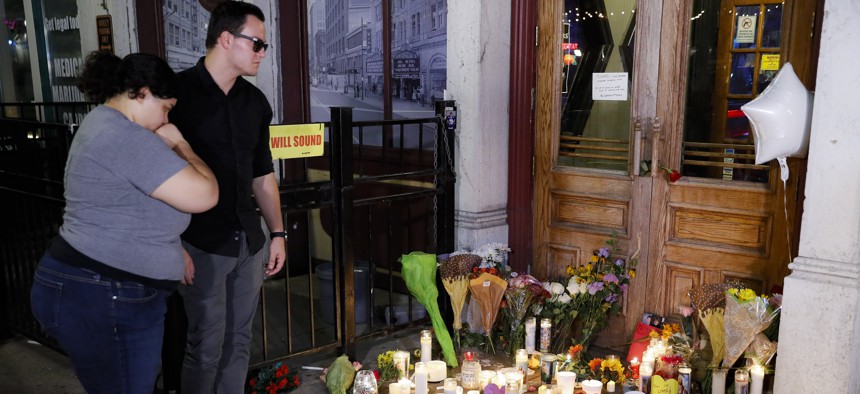Two Mayors on the Mass Shootings in Dayton and El Paso

Mourners visit a makeshift memorial outside Ned Peppers bar following a vigil at the scene of a mass shooting, Sunday, Aug. 4, 2019, in Dayton, Ohio. AP Photo
STATE AND LOCAL ROUNDUP | No more disposable water bottles in San Francisco airport … Challenging new voting law in Florida … A hold on Puerto Rico’s disaster money.
The rapid response of police to the shooting in Dayton’s popular entertainment district early Sunday morning saved hundreds of lives, Mayor Nan Whaley said. “This was an incident that happened in less than one minute. And without the heroic nature of our police department, hundreds could have been injured or died,” the Ohio mayor said during an interview. Nine people were killed and 27 were injured before police shot and killed the shooter, who was armed with a rifle that had a drum holding 100 bullets. In El Paso, Texas, where a man from a Dallas suburb killed 20 people and injured 26 others at a Walmart, Mayor Dee Margo noted that law enforcement officers were on site within six minutes of a call and then apprehended the shooter within minutes after that. When asked about the racist screed against Hispanic immigrants that police believe was written by the shooter, Margo told Fox News his majority Latino city has a powerful connection with neighboring Mexico and the people there. “We have shoppers that come over every day from Mexico to purchase goods and services here. So we’ve been this way—we’re one region for 350 years,” he said. During a news conference on Saturday, Margo emphasized that the shooter wasn’t from El Paso. “It is not what we’re about. We are a special community and this would not have happened from an El Pasoan, I can assure you,” he said. For her part, Whaley noted to NPR that the shooting came just months after Dayton was hit by 14 tornadoes. “I think the difference is that one of these tragedies was completely preventable,” she said. “One of these tragedies has happened 250 times this year in our country.” On Sunday, Ohio Gov. Mike DeWine said “everything’s on the table” about potential gun restrictions in the state, which have generally been rejected by the state legislature. “We should have this discussion,” he said, adding he didn’t want to delve into details out of respect for the shooting victims. [Dayton Daily News; NPR; Fox News; El Paso Times; Columbus Dispatch]
AIRPORT WATER | The San Francisco airport will no longer allow the sale of disposable plastic water bottles as of August 20. Flavored water will be exempted from the ban, which is believed to be the first at an airport in the United States. “We’re on the leading edge for the industry, and we want to push the boundaries of sustainability initiatives,” SFO spokesman Doug Yakel said. [San Francisco Chronicle]
VOTING RIGHTS | Civil rights groups in Florida are trying to block a new law that will require people convicted of felonies to pay any fines and fees they own before their voting rights are restored. The law adds restrictions to a constitutional amendment approved by voters last fall restoring the voting rights of former felons. [Orlando Sentinel]
PUERTO RICO | The Trump administration is delaying sending $9 billion in disaster mitigation funds to Puerto Rico and the U.S. Virgin Islands, saying corruption issues warrant the delay. But the administration did release $7 billion to nine states. The announcement comes during a turbulent period for Puerto Rico, as Gov. Ricardo A. Rosselló stepped down following protests about corruption. The money is meant to help communities hit by disasters prepare for the next ones. Diane Yentel, the president of the National Low Income Housing Coalition, noted that the administration’s latest delay for Puerto Rico comes 18 months after Congress appropriated the money. [New York Times]
CAT SENTENCE | A 79-year-old woman from Garfield Heights, Ohio will find out Tuesday whether she will have to serve a 10-day sentence for feeding stray cats, a violation of a city ordinance. Nancy Segula said she has vowed not to feed cats any more. “I love cats; I have for a long time. But there is a point where I have to think about myself. I don’t want to get into any more trouble than I’m already in,” Segula said. A review by cleveland.com found the sentence imposed by a judge last month is harsher than those given to people convicted of harming animals. [cleveland.com]
Laura Maggi is the Managing Editor of Route Fifty.
NEXT STORY: Ensuring That Disaster Planning Considers People With Disabilities






